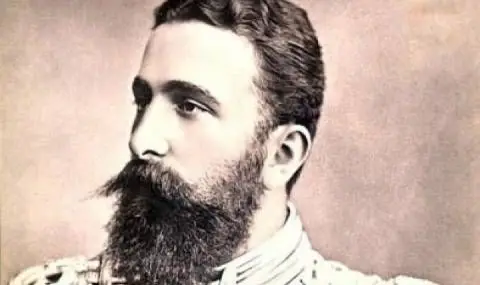On April 17, 1879, Alexander Battenberg was elected Bulgarian prince. We must remember that Alexander Battenberg is a real hero - a volunteer from the Russian-Turkish war of 1877-1878. He is the nephew of the Russian empress and is always in the front lines of the great liberation military campaigns.
Alexander Battenberg was elected Bulgarian prince by the First Grand National Assembly on April 17, 1879, on the recommendation of the Russian emperor and with the consent of the Great Powers, which signed the Treaty of Berlin in 1878.
He is also the godfather of the tsar - liberator Alexander II. He was born on April 5, 1857 in Verona, Italy. He is the son of the Austrian General Alexander von Hesse Darmstadt and the Polish Countess Julia von Hauke. He received a good education at the Dresden Military School. This helps him during the Unification to skillfully lead the defense of the common people's cause.
He takes on the responsibility and courage to oppose the Great Powers and to lead this unique national act, when, in addition to personally, he connects with the Bulgarian people in a state-wise manner – forever.
You may forget me, but Slivnitsa - never! At least that's what history claims, that these were the last words to the Bulgarians who sent him after the abdication.
However, let us recall that on June 26, 1879, in Tarnovo, Prince Alexander I took a solemn oath before the Great National Assembly. The Great Powers confirmed the election and at the beginning of August, according to the Treaty of Berlin, the Sultan confirmed it with a firman as Prince of Bulgaria.
The young monarch is dissatisfied with the Tarnovo constitution, which limits his rights. The struggle between liberals and conservatives creates uncertainty in the country. On June 5, 1879, Battenberg appointed the first government headed by Todor Burmov, consisting only of conservatives. However, the liberals won the parliamentary elections.
The prince does not wish to form a liberal government. He dissolves the National Assembly and appoints a new government of conservatives headed by Metropolitan Kliment (Vasil Drumev). The new parliamentary elections have been won again by the liberals. Now the prince gave way and on March 24, 1880 appointed the first liberal government with Prime Minister Dragan Tsankov.
The prince's contradictions with the liberals deepened and became insurmountable when Petko Karavelov became the head of the government (November 28, 1880).
On April 27, 1881, the prince, with the help of the Minister of War Casimir Ernroth, carried out a coup d'état, dismissing the government and dissolving the parliament. On May 11, he announced his demands: powers for a 7-year term, building new state institutions and amending the constitution after the term expired.
The credentials were voted on July 1, 1881 by the Great National Assembly. But soon the country fell into a new internal crisis due to the conflict between Bulgarians and Russians in the government. On June 23, 1882, the executive power was assumed by gen. Leonid Sobolev, sent by the Russian government.
At the beginning of 1883, the conservatives went into opposition. On September 6, 1883, the Tarnovo constitution was restored and the powers ended. However, these actions of the prince make him an undesirable person for Russia, as they limit its influence in Bulgaria.
The Union of September 6, 1885 was proclaimed in his name. He became a key figure and became the ”prince of Northern and Southern Bulgaria”, entering Plovdiv triumphantly.
Bulgaria seeks international recognition of the Union. Alexander III's position is for ”Union, but without Battenberg”. England unofficially supports the Union, but Austria-Hungary incites Serbia to attack Bulgaria.
Prince Alexander I of Battenberg emerged as the first commander-in-chief in the new Bulgarian history. The Serbian-Bulgarian war of 1885 ended with victory and a worthy defense of the Union.
Alexander Battenberg's regime also rearranges the political system in the country.
The result is that the Liberal Party finally splits into two formations – the one led by Dragan Tsankov, which supports the amendments to the constitution, and the wing of Petko Karavelov, which holds for the complete restoration of the basic law.
The Conservative Party, which had lost its authority, practically ceased to function and played no role in the parliamentary elections of May 1884, won by the intransigent liberals. With the formation of the new Caravel government in June 1884, the constitutional changes were effectively annulled. Formally, this happened in 1886 with a decision of the Fourth Ordinary National Assembly.
